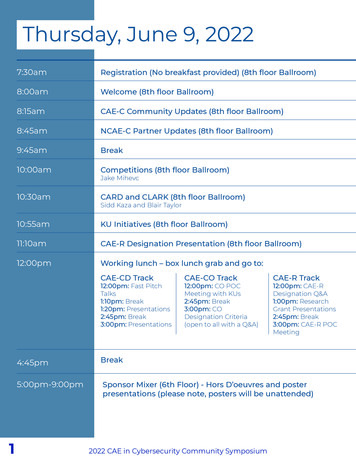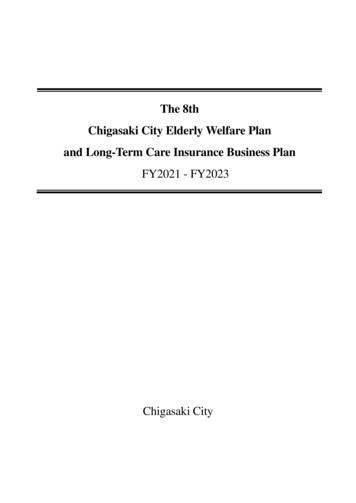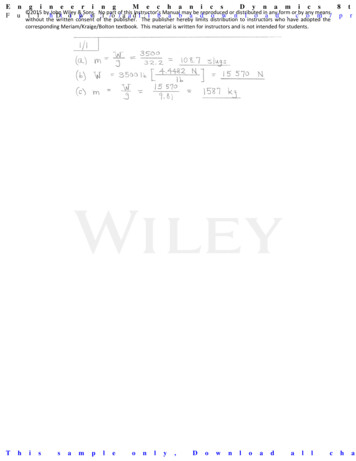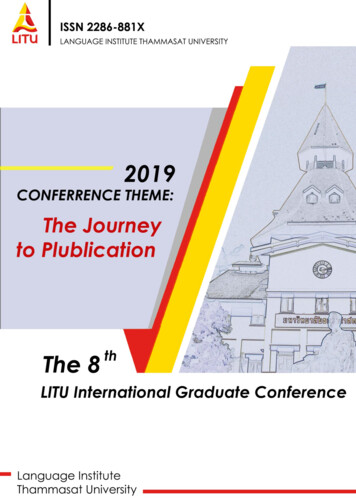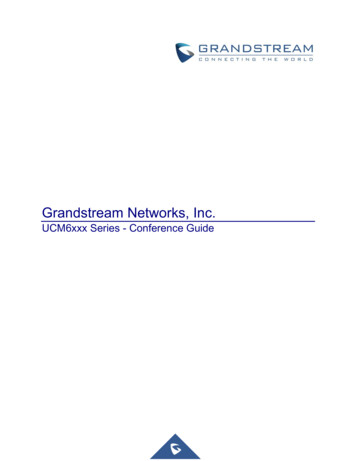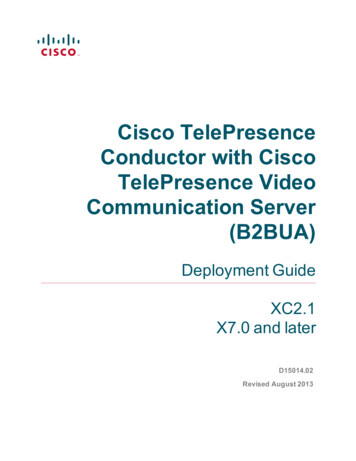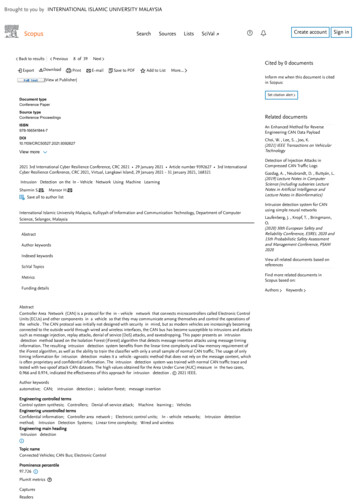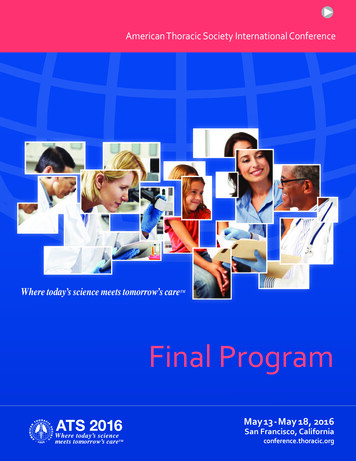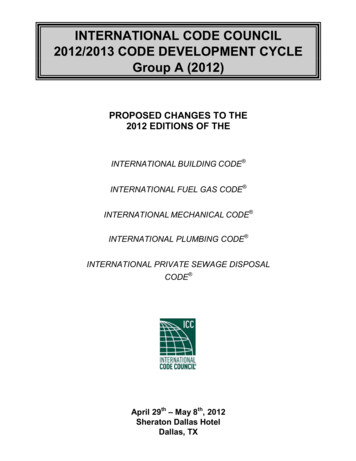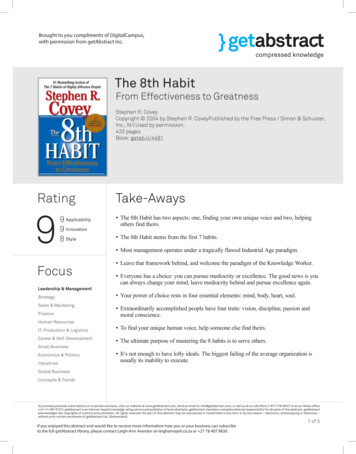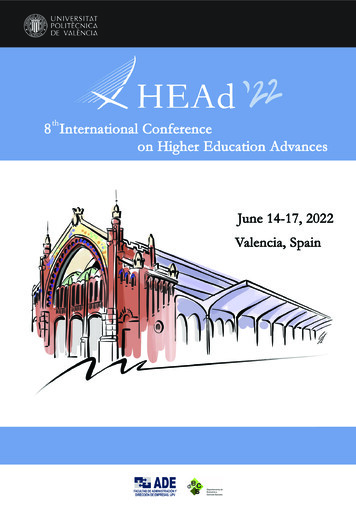
Transcription
8th International Conferenceon Higher Education AdvancesJune 14-17, 2022Valencia, Spain
INDEXWelcome Message4Committees6Brief program10Keynotes11Wednesday 1514Thursday 1620Friday 1728Social Program30Additional Information31
WELCOME MESSAGEWelcome to the Eighth International Conference on Higher Education Advances (HEAd’22), held in Valencia, Spain, from 15 to17 June 2022.HEAd has adapted to the evolving mobility restrictions relatedto the Covid-19 pandemic, and this eighth edition is in a hybridformat for the first time: in-person and virtually, simultaneously.This made it the most complex edition in organizational terms,so far.Josep Domenech4The pandemic is teaching us that adaptation is key, as everything may change in a very short time period. The hybrid formatis the response of the HEAd conference to the changing restrictions. Once again, the conference is a great success of participation and consolidated the series of HEAd conferences as aleading forum for researchers and practitioners to exchangeideas, experiences, and research results relating to the preparation of students and the organization of higher education systems.The selection of the papers for the scientific program was conducted by a team of 177 committee members representing 47countries on all five continents. Following the call for papers, theconference received 270 full paper submissions with authorsfrom 56 different countries. All the submitted papers were reviewed by at least two program committee members under adouble-blind review process. Finally, 77 papers were acceptedas full papers for oral presentation during regular sessions, representing an overall full paper acceptance rate of 28.5%. Thisselection ensures a high-quality program that is greatly valuedby the research communities. Additionally, 52 submissions wereaccepted for short paper presentations and 34 for posterpresentations, all of them receiving high review scores and published by UPV Press. The organization committee congratulatesall the authors for having their papers accepted in such a competitive conference.The contents of the program represent quite well the situationthat global education is living by adapting to the mobility restrictions imposed during the Covid-19 pandemic. It is noteworthy that two of the most repeated topics are related to onlineand hybrid teaching. Skill and competency development is another current topic that attracted the interest of the scientificcommittee, together with the specificities of STEM education
and the use of digital technology to support teaching. Emergingtopics such as sustainability in education and gender studiesalso have their room in the program.HEAd’22 also features three keynote speakers that will overviewimportant and current topics: Cesar Ortega-Sanchez (CurtinUniversity, Australia) is talking about putting all the pieces together regarding student learning. The second keynote speech isdelivered by Jose V. Benlloch-Dualde and Lenin Lemus(Universitat Politecnica de Valencia, Spain) and deals with a hottopic in higher education: Learning analytics or how to improvethe teaching and learning processes from data.The conference is supported and hosted by the Faculty of Business Administration and Management of the Universitat Politecnica de Valencia, which has been recently ranked as the besttechnical university in Spain by the Academic Ranking of WorldUniversities (ARWU) 2021.The organizing committee would like to thank all of those whomade this year’s HEAd possible. Particularly, thanks are indebted to the invited speakers, authors, scientific committee members, reviewers, session chairs, presenters, sponsors, supporters,and all the attendees, both virtual and in person. My final wordsof gratitude must go to the Faculty of Business Administrationand Management of the Universitat Politecnica de Valencia forsupporting, once again, the HEAd conference, making it possibleto become a great event.June 2022Josep DomenechGeneral Chair5
ORGANIZING COMMITTEEGeneral chairJosep Domenech, Universitat Politecnica de ValenciaPublicity chairsGareth Bramley, University of SheffieldDaniela Zehetmeier, Munich University of Applied SciencesLocal organizationEduardo Cebrian Cerda6Rosa Llacer IglesiasPilar Malagon SelmaHector Martínez CabanesEduardo Toran LamataJoan Manuel ValenzuelaSponsors and SupportersUniversitat Politecnica de ValenciaFacultad de Administracion y Direccion de EmpresasDepartamento de Economía y Ciencias Sociales
Program CommitteeM’hammed Abdous, Old Dominion University,USASamuel Abramovich, University at Buffalo SUNY,USAMifrah Ahmad, Deakin University, AustraliaNorasmatul Akma Ahmad, University of Malaya,MalasiaM. Angeles Alcaide, Universitat Politecnica deValencia, SpainDaniel Alonso-Martinez, Universidad de Leon,SpainAsier Aranzabal Maiztegi, University of the Basque Country, SpainJose Luis Arquero, Universidad de Sevilla, SpainLinda Austin, RMIT University, VietnamRaquel Ayala Carabajo, Escuela Superior Politecnica del Litoral, EcuadorJ.P. Bakken, Bradley University, USAAlice Barana, University of Turin, ItalyVirginia Barba-Sanchez, Universidad de CastillaLa Mancha, SpainElvira Barrios Espinosa, University of Malaga,SpainPaula Bartel, Kempten University of AppliedSciences, GermanyJose V. Benlloch-Dualde, Universitat Politecnicade Valencia, SpainMarnie Binder, California State University, USAFran C. Blumberg, Fordham University, USAIgnacio Bosch Roig, UPV, SpainGregory D. Breetzke, University of Pretoria,South AfricaDomenico Brunetto, Politecnico di Milano, ItalyBarbara Bruno, University of Hawaii & CEIP ElCarrascal, USAEliseo Bustamante, UPV, SpainMarina Buzzi, Istituto di Informatica e Telematica – CNR, ItalyLaura Cabeza-García, University of Leon, SpainMarisol Calabor, Universitat de Valencia, SpainJavier Calvo Saiz, Universitat de Valencia, SpainLourdes Canos-Daros, UPV, SpainAdolfo Carrillo Cabello, University of Minnesota,USAJavier Casanoves, Valencian International University, SpainRoberto Cervello-Royo, UPV, SpainDimitris Chassapis, National and KapodistrianUniversity of Athens, GreeceErika Corradini, University of Southampton, UKJamie Cotler, Siena College, USAAndrew M. Cox, Edinburgh Napier University, UKDaniela-Maria Cretu, Lucian Blaga University ofSibiu, RomaniaRaul de Arriba, Universitat de Valencia, SpainDiego Víctor de Mingo-Lopez, Universitat JaumeI, SpainIgnacio J. Díaz-Maroto, University of Santiago deCompostela, SpainMarilyn Dono-Koulouris, St. John’s University,USAPablo Duran Santomil, Universidad de Santiagode Compostela, SpainSteve Eager, University of the West of Scotland,UKJan Elen, KU Leuven, BelgiumMaría Escriva, Universitat de Valencia, SpainCarmen Fernandez-Polvillo, Universidad deSevilla, SpainJoaquim Filipe Ferraz Esteves Araujo, Universityof Minho, PortugalSandro Nuno Ferreira Serpa, University of theAzores, PortugalMargarida Figueiredo, University of Evora, PortugalSylwia Izabela Filipczuk-Rosinska, Polish AirForce University, PolandBjorn Fisseler, FernUniversitat in Hagen, GermanyNuno Flores, University of Porto, PortugalSilvia Florea, Lucian Blaga University of Sibiu,RomaniaFrancesco Floris, University of Turin, ItalyThomas Fuhrmann, OTH Regensburg, GermanyJosep Gallifa, Ramon Llull University, SpainGonzalo García Ros, Universidad Politecnica deCartagena, SpainConsuelo Garcia Tamarit, Universidad Internacional de la Rioja, SpainSuzanne Gatt, University of Malta, MaltaDaniela Gil-Salom, UPV, SpainMª de Fatima Goulao, Universidade Aberta, PortugalRabah Halabi, Hebrew university and Oranimcollege, IsraelKatrin Herget, University of Aveiro, PortugalPeter Hockicko, University of Zilina, Slovakia7
8Sarka Hubackova, University of Hradec Kralove,Czech RepublicJuan Carlos Jimenez Munoz, Universitat deValencia, SpainBeatriz Jimenez Parra, Universidad de Leon,SpainJames Johnston, University of the West ofScotland, UKSrecko Joksimovic, University of South Australia,AustraliaRene F. Kizilcec, Cornell University, USABlanka Klimova, University of Hradec Kralove,Czech RepublicMarusa Hauptman Komotar, Institutum Studiorum Humanitatis (ISH), SloveniaAleksandra Kulpa-Puczynska, Cardinal StefanWyszynski University, PolandChiu-Lin Lai, National Taipei University of Education, TaiwanMichael Lang, National University of Ireland,IrelandMarc Laperrouza, Ecole Polytechnique Federalede Lausanne, SwitzerlandClotilde Lechuga, University of Malaga, SpainCarlos Lerma, UPV, SpainMaria Limniou, University of Liverpool, UKGuan-Yu Lin, National Chunghua University ofEducation, TaiwanRafael Dueire Lins, Universidade Federal Ruralde Pernambuco, BrazilRosa Llacer Iglesias, UPV, SpainMaría Lorenzo-Rial, Universidade de Vigo, SpainPorcuna Luis, UPV, SpainNicolaas Luwes, Central University of Technology, South AfricaElsa María Macías Lopez, Universidad de LasPalmas de Gran Canaria, SpainBrenda Mallinson, Rhodes University, SouthAfricaSathiamoorthy Manoharan, University of Auckland, New ZealandMarina Marchisio, University of Turin, ItalyCelio Gonçalo Marques, Polytechnic Institute ofTomar, PortugalKonstantina Martzoukou, Robert Gordon University, UKGuillermo Mateu, University of Valencia, SpainDavid Menendez Alvarez-Hevia, University ofOviedo, SpainMaría Jose Miquel-Romero, University of Valen-cia, SpainMaría del Mar Miralles Quiros, University ofExtremadura, SpainUlisses Miranda Azeiteiro, University of Aveiro,PortugalJose Miguel Molines Cano, UPV, SpainMatthew Montebello, University of Malta, MaltaDarlinda Moreira, Universidade Aberta, PortugalMichelle Morgan, University of East London, UKBradley J. Morris, Kent State University, USAEstefanía Mourelle, Universidade da Coruna,SpainAna Isabel Munoz Alcon, Catholic UniversitySaint Theresa of Avila, SpainRaquel Niclos Corts, University of Valencia, SpainMichael Niemetz, OTH Regensburg, GermanyAndrea Nikischer, SUNY Buffalo State College,USARosella Nicolini, Universitat Autonoma de Barcelona, SpainOmid Noroozi, Wageningen University and Research, The NetherlandMaría Isabel Nunez-Pena, University of Barcelona, SpainGloria Olaso Gonzalez, University of Valencia,SpainVictor Oltra, Universitat de Valencia, SpainKateryna Osadcha, Bogdan Khmelnitsky Melitopol State Pedagogical University, UkraineCesar Ortega-Sanchez, Curtin University, AustraliaJulieth E. Ospina-Delgado, Pontificia UniversidadJaveriana Seccional Cali, ColombiaCristina Pardo-Ballester, Iowa State University,USACristina Pardo-García, Universitat de Valencia,SpainElena Paunova-Hubenova, Bulgarian Academy ofScience, BulgariaDieter Pawelczak, UniBw Muenchen, GermanyLuís Pedro, University of Aveiro, PortugalCarmen Perez Esparrells, Universidad Autonomade Madrid, SpainUxio Perez-Rodriguez, University of Vigo, SpainAnja Pfennig, HTW Berlin, GermanyRobert A Phillips, University of Manchester, UKLuísa Helena Pinto, University of Porto, PortugalJulian Pinazo-Dallenbach, Autonomo, SpainPablo Pinazo-Dallenbach, Universitat Politecnicade Valencia, Spain
Soner Polat, Kocaeli university, TurkeyIsabel Pozzo, National Scientific and TechnicalResearch Council, ArgentinaJuris Porozovs, University of Latvia, LetoniaDimitri Prandner, Johannes Kepler University,AustriaNatalija Prokofjeva, Riga Technical University,LatviaFazlul K. Rabbanee, Curtin University, AustraliaSergio Rabellino, University of Torino, ItalyMartin Ramirez-Urquidy, Universidad AutonomaBaja California, MexicoCarlos Roma-Mateo, Universitat de Valencia,SpainMarta Romeu, Universitat Rovira i Virgili, SpainPorcuna Ruben, Universitat de Valencia, SpainCharly Ryan, University of Winchetser, UKAyesha Sadaf, University of North Carolina, USAJuan E. Saavedra, University of Southern California, USADemetrios G. Sampson, University of Piraeus,GreeceEsther Sanabria Codesal, UPV, SpainCarmen M Sanchez-Arevalo, UPV, SpainPrathyusha Sanagavarapu, Western SydneyUniversity, AustraliaMartin Salzmann-Erikson, University of Gavle,SwedenLarissa Sbitneva, Autonomos University of Morelos’ State, MexicoYvonne Sedelmaier, SRH Wilhelm Lohe Hochschule, GermanyFaton Shabani, University of Tetova, Republic ofNorth MacedoniaAlvaro Suarez Sarmiento, Universidad Las Palmas de Gran Canaria, SpainOdette Swart, University of South Africa, SouthAfricaMarcus Tamm, University of Applied LabourStudies, GermanyYing Tang, Southwest University, ChinaJesus Tejada, Universitat de Valencia, SpainAndreia Teles Vieira, NOVA University Lisbon,PortugalDirk Tempelaar, Maastricht University, TheNetherlandIman Tohidian, Allameh Tabataba’i University,IranŁukasz Tomczyk, Jagiellonian University, PolandFrederik Truyen, KU Leuven, BelgiumJani Ursin, University of Jyvaskyla, FinlandMercedes Varela-Losada, University of Vigo,SpainMarta Varo-Martínez, University of Cordoba,SpainJesus Vazquez Abad, Universite de Montreal,CanadaAna Isabel Veloso, University of Aveiro, PortugalHenrique Vicente, University of Evora, PortugalCristina Vilaplana Prieto, University of Murcia,SpainMaría Cinta Vincent Vela, UPV, SpainMaarit Virolainen, University of Jyvaskyla, FinlandMartin Wolf, FH Aachen University of AppliedSciences, GermanyDenise Wood, Charles Sturt University, AustraliaJiun-Yu Wu, National Chiao Tung University,TaiwanJorge Agustín Zapatero Ayuso, Universidad Complutense de Madrid, SpainKaterina Zdravkova, University Ss. Cyril andMethodius, MacedoniaYin Zhang, Kent State University, USARoza Zhussupova, L.N. Gumilyov Eurasian National university, KazakhstanGaoxia Zhu, Nanyang Technological University,SingapurIvan Zilic, The Institute of Economics, SerbiaAna Zorio-Grima, Universitat de Valencia, SpainJoerg Zumbach, University of Salzburg, Austria9
BRIEF PROGRAM10Sessions a and b have on-site presenters:(F) Full papers: 20 min presentation plus 5 min Q&A(S) Short papers: 10 min presentation plus 5 min Q&A(P) PostersSessions c and d have off-site presenters:(F) Full papers: 15 min presentation plus 5 min Q&A(S) Short papers & (P) Posters: 10 min presentation plus 5 min Q&A
KEYNOTESTUDENT LEARNING:PUTTING THE PIECESTOGETHERCesar Ortega-SanchezWednesday 15, 9:30-10:30Room: Salon de Actos (Conference Hall)Cesar is a Senior Fellow of the Higher Education Academyand Fellow of the Curtin Academy. He is currently theacademic lead of the Engineering Foundation Year at Curtin University and is an associate professor in the Schoolof Electrical Engineering, Computing and MathematicalSciences. He is interested on how social and technologicalchanges affect education, and what can be done to facilitate learning and teaching. He is a regular contributor inhigher education conferences as presenter and keynotespeaker. His favourite topics are curriculum and assessment design, first year experience, project-based learningand capstone projects.Education has become a very complex activity. Students(and academics) have to learn how to navigate an oceanof information, technologies, social trends and personalpreferences. On top of that, the Covid pandemic forcedschools and universities to facilitate learning via onlinecontents and activities. Some students are not coping wellwith all these challenges. In his talk Cesar will explainhow some students seem to have lost the ability to learn,and will ask the question: Did they ever get it? He willpresent the facts that led him to this conclusion and someideas that may help students to change the way they approach learning. He will explain how learning is like putting a jigsaw puzzle together and how this simple analogymay change the way people learns and teaches.11Cesar Ortega-Sanchez
KEYNOTELEARNING ANALYTICS OR HOW TOIMPROVE THE TEACHING & LEARNINGPROCESSES FROM DATAJosé V. Benlloch Dualde &Lenin Lemus ZúñigaThursday 16, 12:15-13:15Room: Salon de Actos (Conference Hall)12Jose V. Benlloch-DualdeJose V. Benlloch-Dualde earned a MSc. in Physics from theUniversitat de Valencia, and a Ph.D. in Computer Engineering from the Universitat Politecnica de Valencia(UPV). He is currently Senior Lecturer with tenure at theSchool of Informatics in the UPV, where he teaches different courses related to Electronics and Educational Technology. His research interests relate to technologyenhanced learning and, more in particular, to learninganalytics. He has leaded different innovative projects forover twenty years with a specific focus on technologyenhanced learning. He earned a Hewlett- Packard Technology for Teaching Grant Initiative, Transforming Teaching and Learning through Technology in 2008. He received the Excellence in Teaching Award from UPV in2009. He is currently the Teaching Deputy Head of theComputer Engineering Department at the UPV.
KEYNOTEDr. Lenin-Guillermo Lemus Zuniga earned a MSc. in Computer Engineering from the "Centro de Estudios Avanzados del Insituto Politecnico de Mexico", and he earned aPhD. in Computer Engineering from the UniversitatPolitecnica de Valencia (UPV). Dr Lemus is currently Senior Lecturer with tenure at the School of Informatics inthe UPV. Dr. Lemus teaches courses related to ComputerArchitecture and Big Data infrastructure. Dr Lemus ishead of the research group FAKTUMLAB of the ITACAInstitute of the UPV. His research interest are related todata governance and crypto-currency Dapps. Dr Lemushas been author and coauthor of 27 journal articles andhe has participated in 28 international and national research projects.Nowadays, using digital platforms and tools is very common, regardless the educational approach. Thus, moreand more data related to student activity can be gathered.Learning Analytics is about how processing these information sources to better understand and improve educational processes. In this talk, the different steps from dataacquisition to dashboard creation will be presented.Lenin Lemus Zuniga13
WEDNESDAY 15Session 1a. Health Sciences Education (I)Wednesday 15, 11:00 – 13:15. Room 1 and Virtual Room 1. Chair: Betty Exintaris(F)Integrating transversal skills into higher education in health and social careNathalia Rosa, Marta Benet, Mar Carrio(F)Introduction to bioethics through mobilization of critical thinking skillsJean-François Bodart, Marie-Helene Canu, Vanessa Dehennaut, Erwan Dupont, Maxime Pauwels(F)Contemporary pharmacology teaching methods in the Covid-19 eraHala Fouad AzhariA case study comparing the flipped hybrid classroom and traditional classroom in a post-graduate chemical pathology module(F)Rivak Punchoo, Sachin Bhoora, Liz WolvaardtDesigning a Novel Interprofessional and Inter-University Education Sessionfor Healthcare Trainees to Improve Interprofessional Practice(S)14Justine Hamilton, Ashwini Namasivayam-Macdonald, Linnea Shackel, Heather MacpheeSession 1b. Learning and Educational ModelsWednesday 15, 11:00 – 13:15. Room 2 and Virtual Room 2. Chair: Omid NorooziEmbedded Course Level Assessment for Effective Assessment of ProgramLearning Outcomes(F)Walid Ibrahim, Amr Sweedan, Hazem Ibrahim, Sayed Marzouk, Wissam Ibrahim, Taoufik ZoubeidiNormative isomorphism: The patterns of profession of academics at Turkishhigher education(F)Inci Ozturk ErkocakA Framework for Facilitating Acquisition and Improvement of NegotiationSkills by Business Students(F)Stephen J.J. Mcguire, Ellen A. DrostCo-created model of social innovation that promotes social impact in Vocational Training Institutions(F)Juan Ignacio Díaz, Gabriela Carrasco, Diego Ramírez, Waldo Soto, Alex Silva(F)Relationships in teaching for critical thinking dispositions and skillsSusan K Walker, Samantha LeboeufSession 1c. Assessment and EvaluationWednesday 15, 11:00 – 13:15. Room 3 and Virtual room 3. Chair: Marvi RemmikComparing standard with high-ability groups at university: differences in GPAfor equally able students and gender-differentials(F)Pilar Beneito Beneito, Oscar Vicente-Chirivella
(F)Building Teacher Professional JudgementRayanne ShakraA review of tertiary formative assessment using digital technology in the pastdecade: what has been facilitated?(S)Li Liang, James Tognolini, Graham Hendry, Lilia MantaiUse of Assessment and Feedback Systems for Introductory Computer Programming Modules of Higher Education: A Comparative Study(S)Jagadeeswaran Thangaraj, Monica Ward, Fiona O’Riordan(S)Build an Assessment Rubric of Student Creativity in Higher EducationWeiping Xu, James TognoliniPerception and confidence on weather forecasts among Spanish undergraduate students enrolled in different subjects related to physics(S)Igor Gomez, Enric Valor, Sergio Molina, Raquel Niclos, Vicente CasellesCo-assessment and self-assessment as types of evaluation in an online andoffline blended learning(P)María-Del-Carmen Alarcon-Del-Amo, Elena Alarcon-Del-AmoSession 1d. Technology in Education (I)Wednesday 15, 11:00 – 13:15. Room 4 and Virtual room 4. Chair: Dimitri PrandnerExamination of online education experiences from stakeholder perspective –a Hungarian case study(F)Laszlo Buics, Peter Foldesi, Orsolya Putz, Zoltan Varju, Zsolt Csaba Horvath, Boglarka B. EisingerneVisionARi: An online community-based augmented reality platform for immersive learning(F)Jungjin Park, Ryu Fattah, Larry K.B. LiLearning Analytics for Measuring Engagement and Academic Performance: ACase Study and Future Directions(S)Michael LangUsing data analysis to predict the students’ trend of choosing preferred datastorage(P)Georgi Nikolov Cholakov, Asya Georgieva Stoyanova-Doycheva(P)Analysis of explicitation evidence in technical translationKatrin Herget, Teresa Alegre(S)Assessing the impact of recorded lectures on learning effectivenessJinhui Zhang, Poon Leung, Chong It Tan, Alan Xian(P)Digital skills of Valencian university studentsDaniel Lloret-Irles, Jose Vicente Segura-Heras, Antonio Miguel Nogues-Pedregal, Claudia SaumellCastello, Maria Akita-Udrea15
Session 2a. Innovative Learning Experiences (I)Wednesday 15, 14:30 – 16:15. Room 1 and Virtual Room 1. Chair: Jami Cotler(F)Ethanol in class and at home: guided inquiry-based learningSergio Paulo Jorge RodriguesTeaching Data-Enabled Design: Student-led Data Collection in Design Education(F)Renee Noortman, Peter Lovei, Mathias Funk(F)Do Active Learning Classrooms make for Active Teaching?Bas Blom, Kirsten Van Den Bosch, Hans Beldhuis, Pauline Schreuder, Greetje TimmermanIncreasing engagement and student participation in Higher Education: insights from the University of Pisa during COVID-19(F)Lukasz Szczygiel, Alessandro Iannella, Maria SimiThe influence of COVID-19 pandemic on students’ screen time, learning, lifestyle, and well-being(S)Juris Porozovs, Viktors Veliks, Aija Klavina, Anna Zusa16Session 2b. Online and Hybrid Learning (I)Wednesday 15, 14:30 – 16:15. Room 2 and Virtual Room 2. Chair: Anja PfennigTowards a framework for interdisciplinary collaborative online learning spaces(F)Carolina Lucia Van Den Berg, Belinda VersterThe effects of students’ perceived usefulness and trustworthiness of peerfeedback on learning satisfaction in online learning environments(F)Nafiseh Taghizadeh Kerman, Seyyed Kazem Banihashem, Omid Noroozi, Harm J. A. BiemansHarnessing the potential of online learning in Italian Universities: form blended classes to MOOCs(S)Alexandra Chavarria Arnau, Cecilia Dal BonStudents’ perceptions of gained and lost value: a case study of a summerschool that had to suddenly move online(S)Alvaro Pina Stranger, German Varas, Gaelle Mobuchon(S)How to support cooperation in hybrid learning?Anne Uukkivi, Oksana Labanova, Britt Petjarv, Kati Nouakas
Session 2c. Organization of Higher EducationWednesday 15, 14:30 – 16:15. Room 3 and Virtual room 3. Chair: Jagadeeswaran Thangaraj(F)ECTS, workload, and quality of higher educationJose Maria RivadeneyraDo universities have a distinctive brand personality? The case of ECIU Universities(F)Ana Estima, Cristina GuimaraesBehind higher education decisions: Estonian students’ take on choosinghigher education institute and speciality(F)Helen Urmann, Marvi Remmik, Ene TubeltImproving governance of vocational teacher education in Ukraine withinErasmus Project(F)Oksana MelnykValues Education and Teaching Zest for Life: Japanese Experience and NewUkrainian School Reform(P)Svitlana Anatoliivna Kuzmina, Olga Vasylivna Matvienko, Valeriia Vasylivna KudinaModifications and Accommodations for Higher Education Students with Special Educational Needs(S)Lenka Sokolova, Miroslava Lemesova, Marian GromaSession 2d. Economics and Social Sciences EducationWednesday 15, 14:30 – 16:15. Room 4 and Virtual room 4. Chair: Pilar Beneito(F)Enhancing learning in the Finance classroomPilar Corredor, Isabel Abinzano, Cristina Del Rio, Elena Ferrer, Ana Gonzalez, Jose Manuel Mansilla,Beatriz Martinez, Luis MugaUniversities’ Attractiveness and Grading Policies: A Spatial Competition Model(F)Gabriele Lombardi, Eugenio VicarioRebuilding our Toolkits for the future – How social science research educators changed their teaching in 2020 and 2021 to be fit for a digital future(F)Dimitri Prandner, Katrin HasengruberCovid-19 pandemic, school closures and perception of the importance of education in the country(F)Cristina Vilaplana-PrietoThe International System and the Transformation of Democracy in the 21stCentury: Reflecting on a Virtual Exchange Module between Italy and the UnitedStates during COVID(P)Kimber M Quinney, Alessandro Quarenghi17
Session 3a. Sustainability and EngineeringWednesday 15, 16:45 – 18:15. Room 1 and Virtual Room 1. Chair: Juris PorozovsCore Competences in Agri-food Sustainability: Student Self-Assessment AfterOnline Action-Learning(F)Katherine M Flynn, Christoph F Knobl, Line LindnerDevelopment of Sustainability Competencies in a Higher Education SemesterProgram on Smart Sustainable Cities(F)Rien Van Stigt, Martijn RietbergenFlipped classroom – a solution to teach the unloved iron carbon phase diagram in first year engineering during the Covid-19 pandemic(F)Anja PfennigFrom project-based to problem-based learning in engineering disciplines:enhancing Cartography and Geomatics education(S)Georg Gartner, Andrea Binn, Jelena Gabela, Gunther Retscher, Vassilis Gikas, Manuela Schmidt,Wangshu Wang18Session 3b. Entrepreneurship and EmploymentWednesday 15, 16:45 – 18:15. Room 2 and Virtual Room 2. Chair: Anne Uukkivi(F)A Quality 4.0 Assurance Framework for the Higher Education InstitutesMuhammad Wasif, Sarosh Hashmat Lodi, Asif Ahmed Shaikh, Muhammad Tufail, Faaz Ahmed Butt(F)Willingness to Enhance EmployabilityEszter Kiss, Jami Cotler, Eben Afrifa-YamoahSurvive to stay connected: patterns of user experiences in a Life Long Learning digital platform(F)Marta Cannistra, Mara Soncin, Federico FrattiniDesign-Based Learning and Student Entrepreneurship: How Learning DesignSupports Non-Design Students’ Aspirations(S)Layal Shuman
Session 3c. Competency DevelopmentWednesday 15, 16:45 – 18:15. Room 3 and Virtual room 3. Chair: Jose Manuel MansillaFostering Key Competencies for Sustainability: Development of a Higher Education Teaching Format based on Service Design(F)Silke Bustamante, Martina Martinovic, Thomas AfflerbachTransform the learning journey in behavioral competency development programs to attain sustainable personal change(F)Sara Bonesso, Laura Cortellazzo, Fabrizio GerliLet Others Shine: Key Competencies in European Research Infrastructuresand Core Facilities(P)Dimitri Prandner, Philip Caspar SinnerCritical Thinking in Information Literacy Pedagogical Strategies: new dynamics for Higher Education throughout librarians’ vision(S)Tatiana Sanches, Carlos Lopes, Maria Luz AntunesSession 3d. STEM Education (I)Wednesday 15, 16:45 – 18:15. Room 4 and Virtual room 4. Chair: Domenico BrunettoStructuring knowledge as a strategy and tool for learning and evaluation inengineering education(F)Jack Fernando Bravo-Torres, María Dolores Fernandez-Perez, Cinthya María Cevallos-Ludena, Esteban Fernando Ordonez-Morales, Wilson Daniel Bravo-TorresContextualization courses for engineering students based on sociotechnicalthinking(P)Jorge Rojas-Alvarez, Javier Jimenez Becerra, Monica Bustamante SalamancaUse of engineering cases as alternative assessments in material characterization course(S)Hong Tao(S)Practical approaches to delivering pandemic impacted laboratory teachingNigel James Francis, David P. Smith, Ian J. Turner19
THURSDAY 16Session 4a. STEM Education (II)Thursday 16, 9:00 – 10:30. Room 1 and Virtual Room 1. Chair: Barbara Bruno(F) High school mathematics knowledge level of technical university studentsLukas Pospísil, Dagmar Dlouha, Karolina Dlouha(F)Mathematics’ war – real or imaginary?Janine Esther HechterOPS4Math project – Optimization and Problem Solving for Teaching of Mathematics: teaching strategy, organization and objectives(S)Claudio Sterle, Maurizio Boccia, Adriano Masone, Angela Orabona, Antonio Sforza(S)Development of a Muon detector for educational purposesRiccardo Nicolaidis, Roberto Iuppa, Francesco Nozzoli, Leonardo RicciSession 4b. Technology in Education (II)20Thursday 16, 9:00 – 10:30. Room 2 and Virtual Room 2. Chair: Ayesha SadafEnhancing student engagement in reflecting on professional skills development using digital tools for data collection and distribution(F)Klaas Jan HuizingComparing online and on-campus students’ perceptions of the digitalizationof higher education institutions(F)Henning Brink, Sven Packmohr(S)EXITrun – A Lecture as a Virtual Educational Escape GameMartin R. Wolf, Klemens Kohler(S)Using Augmented Reality to improved understanding of the Carbon cycleCarme Huguet, Jillian Pearse, Alvaro Lozano-Tarazona(S)CAPuS e-learning platform for the Conservation of Art in Public SpacesTina Lasala, Floriana Vindigni, Dominique Scalarone, Monica Gulmini, Paola Croveri, Chiara Ricci,Arianna ScarcellaSession 4c. Arts and DesignThursday 16, 9:00 – 10:30. Room 3 and Virtual room 3. Chair: Christina PanayiAnti-Disciplinary Works, Speculative Words. A Teaching Experience of Communication Design Based on Tinkering and Speculation(F)Francesco E. Guida, Claudia TrantiA Jewelry-Tech Experience: Teaching and Learning Model for Academic Training(F)Livia Tenuta, Alba Cappellieri, Susann
also have their room in the program. HEAd ï22 also features three keynote speakers that will overview important and current topics: Cesar Ortega-Sanchez (Curtin University, Australia) is talking about putting all the pieces to-gether regarding student learning. The second keynote speech is delivered by Jose V. Benlloch-Dualde and Lenin Lemus
